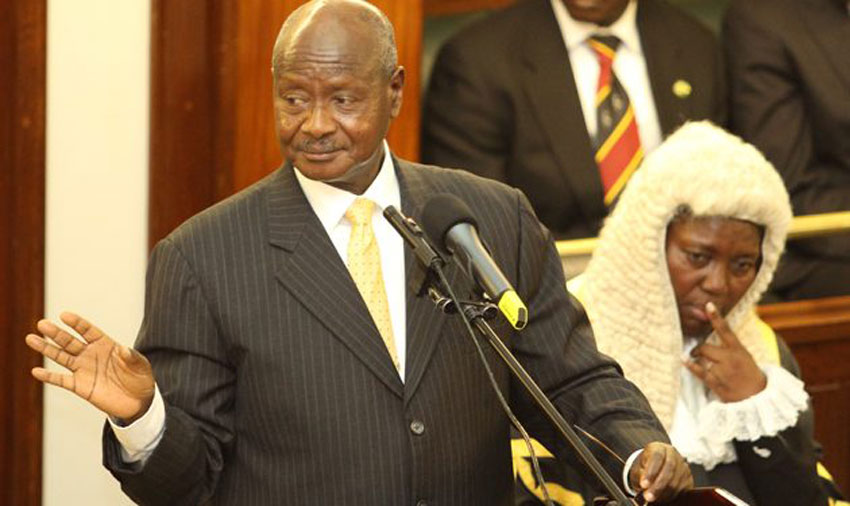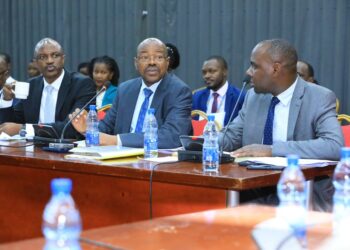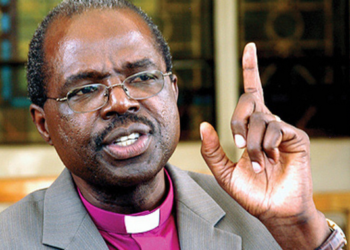The controversies surrounding the handling of the COVID-19 crisis have for weeks now stoked the fire in the hearth of the row between President Yoweri Museveni and Speaker of Parliament Rebecca Kadaga in particular as well as the executive and legislative arms of government.
Somewhat overshadowed by what seems like an outcome of a trade off in the passing of the Shs304bn Coronavirus supplementary budget – with the legislative assembly reserving Shs10bn for MPs, and the rest of the cash meant to bolster efforts by the COVID-19 National Taskforce – a political storm is brewing behind the scenes, and clash between Parliament and the Presidency is unfolding.
Both members of the ruling National Resistance Movement (NRM) party – the two leaders have enjoyed a frosty relationship for almost a decade in their positions as number one and number three, especially ever since Kadaga told Museveni to deal with former Speaker of Parliament Edward Kiwanuka Ssekandi’s political placement, clearly indicating to the president that she was tired of waiting in the queue for Ssekandi to give way for her to ascend to the position of head of the legislature.
That is not to say that Kadaga and Museveni have not held each other’s back for symbiotic benefit. For example, Parliament has played its role in helping the executive push through amendments vital for the executive arm. At the end of 2017, the controversial removal of the age limit from the Constitution was only possible because the head of the legislative arm of government had allowed it to appear as an item on the order paper, just over a year after a presidential election.
Without that single amendment, it would have been impossible for President Museveni to extend his rule beyond the age of 75. But with Kadaga presiding over a chaotic House, suspending MPs opposed to the removal of the age limit clause, softly handling the Special Forces Command (SFC) raid on Parliament, and stifling anti-Museveni voices during debate on the matter, Museveni had his 2017 Christmas well delivered.
INTER-COVID19
With the age limit sorted, Kadaga and Museveni enjoyed some semblance of a good working relationship, save for a few instances when the President threw jabs at the Parliamentarians; when Speaker insisted that a Minister appears before the House and offers a clarification – the latest high profile one being Education Minister and Sports Minister and First Lady Janet Museveni on the issue of the revised Curriculum – or when the Speaker openly protested the executive’s attempt to usurp the legislature’s powers.
For example, in November 2019, she told MPs to stop using NRM caucuses to undercut the House. “When we enacted the Administration of Parliament Act, we wanted to be free from executive but now members are lifting issues here, going to the executive to undermine parliament. I don’t attend those caucuses but I just want to retaliate, stop undermining parliament. Stop undermining this institution,” warned the Speaker.
EMERGENCY
With the COVID-19 crisis silencing all other relevant political activities, Parliament has severally sought inclusion in the efforts to prevent the spread of the respiratory disease that has left several nations in a lockdown.
Understandably, the Coronavirus crisis is key for Museveni, MPs and all political players seeking reelection since presidential and parliamentary elections are months away. Therefore, those warming up for positions would want to be seen by the electorate as caring, and capable of managing crises.
One of Kadaga’s attempts to project Parliament as relevant was to advise Museveni to declare a state of national emergency, a process in which the House had planned to assert its position by inviting the President to Parliament to make the pronouncement.
However, the President threw the Speaker’s advice into the dustbin of rejected counsel. Last month, Kadaga and Chief Justice Bart Katureebe had advised the president to declare a state of emergency or risk keeping his directives and lockdown pronouncements in a legal vacuum. But one senior minister told the head-of-state the directives fitted well under the Public Health Act, and it was not necessary to invoke Article 110 of Uganda’s Constitution on emergencies.
Defeated in that high-level meeting, Kadaga was left with one option: to use Parliament to force the executive to declare a state of emergency. However, after MPs had expressed anger at the President’s reluctance to make the pronouncement, debate on the matter lost steam, especially after Attorney General William Byaruhanga told Parliament the Commander-in-Chief wasn’t convinced a state of emergency pronouncement was warranted under the current circumstances.
“When the President forms a view that the enforcement of the statutory instruments has failed, then there shall be a consideration of a state of emergency. He thinks that the current environment does not necessitate a declaration of a statement of emergency,” Byaruhanga told MPs.
FOOD WAR
Having lost on the emergency declaration front, Kadaga and MPs warmed up for ‘the battle of relief distribution.’
Days before Prime Minister Dr Ruhakana Rugunda launched the distribution, Parliament had ordered the executive to halt the exercise until a budget and a plan for supply of food items to all the vulnerable poor in the country had been approved by both arms of government.
With Resident District Commissioners (RDCs) leading District COVID-19 Taskforces in their respective districts, the only way MPs could get into the equation and show their voters that they cared was to ensure inclusion into the relief food distribution efforts. Their calls for decentralisation of the process would have seen them head Constituency COVID-19 Taskforces. Kadaga even complained that while MPs had been blocked from distributing relief food items, and sidelined from COVID-19 efforts, their opponents had taken advantage and were soiling their images in the constituencies.
“Some unscrupulous political opponents are moving around constituencies and distributing relief food. Sadly, they are lying to the electorate that MPs who are quarantined in Kampala do not care about them! This unfair advantage should be addressed by the govt,” said Kadaga, in reference to the arrest, days earlier, of two aides of Betty Naigaga, her opponent in the Kamuli Woman MP seat. Naigaga’s agents had reportedly been distributing relief food to the vulnerable poor instead of taking the items either to the district or national taskforce.
That aside, Museveni has largely ignored the push by Kadaga’s Parliament, at least publicly, only clarifying on who qualified to receive relief food in his April 14 address – during which he also announced a three-week lockdown extension.
SCRAMBLE FOR BUDGET SHARE
The battle for supremacy between the executive and the legislature has previously played out in the budget process. Even when there are open disagreements between the two arms on the floor of the House, both Parliament and State House have always found ways to ensure a win-win situation.
For passing controversial supplementary budgets for State House, security and defence, Parliament has been rewarded with taxpayers’ money under the guise of consultations (most of which never happens, or isn’t necessary), and salaries and allowances that place members among those in Uganda’s privileged class.
When COVID-19 came knocking, MPs, like most government servants, sought opportunities to help – and consequently pocket some cash. But the executive kept knocking parliament off the list of institutions that would take part in efforts to prevent the spread of the disease. However, these efforts needed money to be implemented, and, unlike the issue of the emergency and relief food distribution where the executive easily warded off the legislature, a supplementary budget for COVID-19 efforts, requested months before the end of the 2019/2020 Financial Year, had to be approved by the House.
In the process, MPs sneaked in their demand, leaving the executive in a rock and a hard place. Government had to choose between blocking Parliament’s Shs10bn on grounds that the activities to be covered by that money had been catered for in Ministry budgets or waiting longer as the Kadaga-chaired Parliament shredded the COVID-19 budget, and delayed it in the process.
In the end, a Shs304bn budget was approved and shared among key institutions: Ministry of Health (Shs104 bn), Ministry of Defence (Shs77bn), Ministry of Disaster Preparedness and Refugees (Shs59bn), Ministry of Local Government (Shs36bn), Parliament (Shs10bn), Ministry of ICT and National Guidance (Shs6bn), and Kampala Capital City Authority – KCCA (Shs2bn).
While Parliament will not relent in pushing for involvement in food relief distribution efforts, seen by political pundits as an early campaigning platform, Kadaga and MPs are now preoccupied with defending the Shs10bn cash bonanza after a section of the population took to social media to castigate legislators for being greedy and pocketing millions when the people they represent are sleeping hungry as the second season of the COVID-19 continues to bite. The storm between the executive and the legislature, Museveni and Kadaga, will continue. Whether it gets worse or dissipates will depend on the duo’s decisions during and after the lockdown, and whether they choose to scratch each other’s backs or keep throwing words at each other.
Do you have a story in your community or an opinion to share with us: Email us at editorial@watchdoguganda.com












